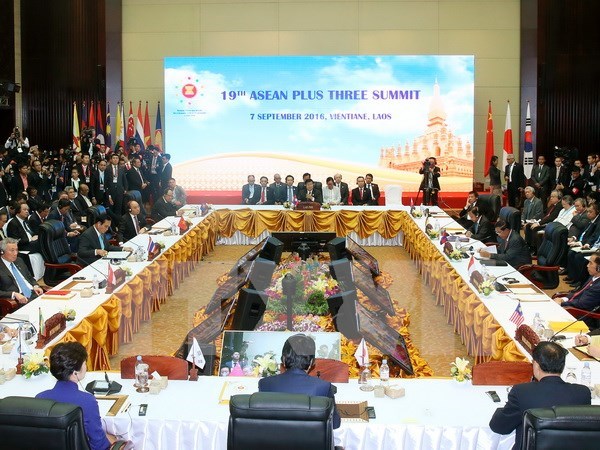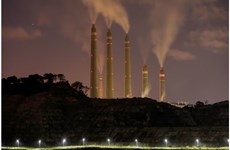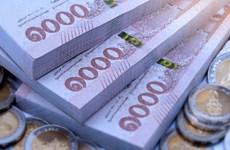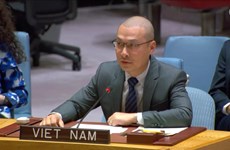External partners seek stronger cooperation with ASEAN
External partners put forth measures to strengthen cooperation with ASEAN in various fields during the ASEAN+1 Summits with the Republic of Korea (RoK), Australia and the UN, ASEAN+3 Summit, in Laos.
 At the ASEAN+3 Summit (Photo: VNA)
At the ASEAN+3 Summit (Photo: VNA)Prime Minister Nguyen Xuan Phuc led a Vietnamese delegation to attend the event.
ASEAN countries suggested partners improve efficiency of existing cooperation mechanisms and assist the association in developing human resources, narrowing development gaps, and coping with trans-national challenges for regional peace, stability and prosperity.
At the ASEAN-RoK Summit, the two sides hailed the initial outcomes in implementing the ASEAN-RoK Action Plan in 2016-2020.
The RoK continues to be one of the important trade and investment partners of ASEAN with two-way trade surpassing 122 billion USD and foreign direct investment (FDI) of nearly 6 billion USD in 2015.
Both sides agreed to continue implementing effectively the ASEAN-RoK free trade agreement while optimising advantages and strength of the ASEAN Economic Community to achieve the target of bringing bilateral trade to 200 billion USD in 2020.
RoK’s President Park Geun-hye noted that the ASEAN Culture House will be put into operation in 2017 in Busan city to increase mutual understanding and cultural exchanges.
The two sides’ leaders agreed to choose 2017 as the year for ASEAN-RoK cultural cooperation, and they welcomed the establishment of the ASEAN-RoK Innovative Centre.
They also agreed to boost cooperation in infrastructure connectivity, forestation, education, information technology, developing micro, small- and medium-sized enterprises and increasing the involvement of private sector.
At the ASEAN+3 Summit with the RoK, Japan and China, leaders underlined the importance of the ASEAN+3 cooperation mechanism to stability and development in East Asia.
Japan pledged to continue supporting ASEAN to develop infrastructure, high-quality human resources, while the RoK will focus more on cultural and people-to-people exchanges.
China said it will consider ASEAN a key tourism market and will continue importing rice from Southeast Asian countries.
Concluding the summit, leaders adopted a Declaration on Sustainable Development
Cooperation and a Statement on Active Aging.
At the ASEAN-Australia Summit, the two sides spoke highly of the outcomes reached since they lifted bilateral ties to a strategic partnership in 2014.
Australia is the eighth biggest trade partner of ASEAN, which in turn ranks second among trade partners of Australia. Bilateral trade exceeded 51 billion USD in 2015.
ASEAN leaders appreciated Australia’s assistance in education and human resources development, including the country’s commitment to providing over 100 million AUD in five years for the New Colombo Plan, which will enhance educational cooperation and people-to-people exchange, and a 46-million-AUD programme on women empowerment.
Both sides agreed to prioritise trade-investment cooperation, small- and medium-sized enterprise (SME) development, sustainable development, people-to-people exchange. They will also promote cooperation to cope with non-traditional challenges like terrorism, climate change, natural disaster management, trans-national crime, and cyber and marine security.
At the end of the Summit, the ASEAN and Australian leaders approved a joint statement on cooperation in fighting international terrorism.
At the ASEAN-United Nations Summit, the two sides approved a plan of action for the 2016-2020 period, which is the first long-term plan for ASEAN-UN cooperation. It called for combining the implementation of the ASEAN Vision 2025 and the UN 2030 Agenda for Sustainable Development. The plan also includes cooperation in peacekeeping, counter-terrorism, social welfare, health care, education, climate change adaptation and disaster management, women and children’s rights, and promotion of international values and standards.
The UN also vowed to step up assistance to the ASEAN countries to realise the Sustainable Development Goals and share experience in economic structure and development model reforms.
Speaking at the summits, PM Nguyen Xuan Phuc affirmed that Vietnam treasures its relations with the partners. He said Vietnam values the partners’ commitments to continued assistance for ASEAN to build the ASEAN Community and bring into play the bloc’s central role in the region.
He asked the partners to keep fostering their cooperation with ASEAN, especially in the prioritised areas and to bring into play the advantages of each side.
Regarding ASEAN-Republic of Korea (RoK) relations, the Vietnamese government leader asked for the effective implementation of the 2016-2020 action plan with a focus on strengthening economic, trade and investment partnerships, and increasing the regional connectivity in both hard and soft infrastructure.
He called on the RoK to continue helping ASEAN narrow development gap and bolstering ties in other spheres of mutual concern such as green growth, water resources management and sustainable use, information technology, food security, and effective response to non-traditional security challenges.
To foster ASEAN+3 cooperation, the PM asked for stronger collaboration in economics, finance, connectivity, regional economic integration, micro enterprises and SME development, and sustainable development, particularly in renewable energy, green growth, agriculture, food security, climate change response, dealing with natural disasters and epidemics, and terrorism and trans-national crime prevention.
He expressed the support for efforts to bolster tourism, cultural and people-to-people exchanges, through which both economic growth and mutual trust and understanding will be fostered.
Addressing the ASEAN – Australian Summit, PM Phuc highlighted the priority of cooperation in economics, trade and investment in order to increase remarkably the bilateral trade value between the two sides.
Other priorities included improving infrastructure connectivity, and enhancing collaboration in education and training, which is the strength of Australia while ASEAN has huge demand for trained human resources in the building of the ASEAN Community.
The Vietnamese PM said the ASEAN – UN cooperation is important to the regional peace, security and prosperity, calling on the two sides to coordinate to realise the targets set forth in the ASEAN Vision 2025 and the 2030 Agenda of the UN on sustainable development.
He suggested the UN help ASEAN enhance capacity to adapt to climate change and implement the commitments at the 21st Conference of the Parties to the United Nations Framework Convention on Climate Change (COP 21). The UN should also assist ASEAN in building mutual trust and carrying out preventive diplomacy to prevent and manage conflicts in the region.
At all events, the PM shared Vietnam’s stance on the regional and international issues of common interest.
He expressed concern over the recent complicated developments and escalating tension in the Korean Peninsula, reiterating Vietnam’s consistent position of supporting non-nuclearisation on the peninsula, and the settlement of disputes by peaceful measures.
He called on concerned nations to restrain and strictly follow the relevant Resolutions of the United Nations Security Council.
Vietnam shares the deep concerns of the region and the international community over the recent complex developments in the East Sea, which impacted regional peace and security as well as navigation and overflight freedom, Prime Minister Phuc said.
Vietnam backs efforts to steer the East Sea situation along a direction beneficial to regional peace, cooperation and development, he underscored.
He called on partners to actively contribute to maintaining stability, security, safety and freedom of navigation and overflight in the East Sea.
Related parties should restrain themselves and avoid actions that could make situation more complicated, avoid using force or threatening to use force, settle disputes by peaceful measures on the basis of international law, obey the principles and procedures of the Convention on Law of the Sea (UNCLOS 1982) and fully respect diplomatic and legal processes, Phuc said.
He expressed his support for ASEAN and China in effectively implementing the Declaration on the Conduct of Parties in the East Sea (DOC), and quickly reaching a Code of Conduct in the East Sea (COC).-VNA












